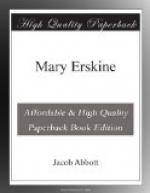Mary Erskine had a vague idea that if the will should prove invalid, she and her children would lose the property, in some way or other, entirely,—though she did not know precisely how. After musing upon this melancholy prospect a moment she asked,
“Should not I have any of the property, if the will proves not to be good?”
“Oh yes,” said Mrs. Bell, “you will have a considerable part of it, at any rate.”
“How much?” asked Mary Erskine.
“Why about half, I believe,” replied Mrs. Bell.
“Oh,” said Mary Erskine, apparently very much relieved. “That will do very well. Half will be enough. There is a great deal of property. Albert told me that the farm and the new house are worth five hundred dollars, and the stock is worth full three hundred more. And Albert does not owe any thing at all.”
“Well,” said Mrs. Bell. “You will have half. Either half or a third, I forget exactly which.”
“And what becomes of the rest?” asked Mary Erskine.
“Why the rest goes to the children,” said Mrs. Bell.
“To the children!” repeated Mary Erskine.
“Yes,” said she, “you will have to be appointed guardian, and take care of it for them, and carry in your account, now and then, to the Judge of Probate.”
“Oh,” said Mary Erskine, her countenance brightening up with an expression of great relief and satisfaction. “That is just the same thing. If it is to go to the children, and I am to take care of it for them, it is just the same thing. I don’t care any thing about the will at all.”
So saying, she threw the paper down upon the table, as if it was of no value whatever.
“But there’s one thing,” she said again, after pausing a few minutes. “I can’t keep any accounts. I can not even write my name.”
“That is no matter,” said Mrs. Bell. “There will be but little to do about the accounts, and it is easy to get somebody to do that for you.”
“I wish I had learned to write,” said Mary Erskine.
Mrs. Bell said nothing, but in her heart she wished so too.
“Do you think that I could possibly learn now?” asked Mary Erskine.
“Why,—I don’t know,—perhaps, if you had any one to teach you.”
“Thomas might teach me, perhaps,” said Mary Erskine, doubtfully. Then, in a moment she added again, in a desponding tone,—“but I don’t know how long he will stay here.”
“Then you don’t know at all yet,” said Mrs. Bell, after a short pause, “what you shall conclude to do.”
“No,” replied Mary Erskine, “not at all. I am going on, just as I am now, for some days, without perplexing myself at all about it. And I am not going to mourn and make myself miserable. I am going to make myself as contented and happy as I can, with my work and my children.”
Here Mary Erskine suddenly laid her head down upon her arms again, on the little work-table before her, and burst into tears. After sobbing convulsively a few minutes she rose, hastily brushed the tears away with her handkerchief, and went toward the door. She then took the water pail, which stood upon a bench near the door, and said that she was going to get some water, at the spring, for tea, and that she would be back in a moment. She returned very soon, with a countenance entirely serene.




